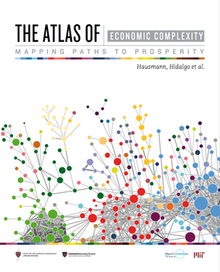The Atlas of Economic Complexity
 2011 paperback cover | |
| Author | Ricardo Hausmann, CA Hidalgo, et al. |
|---|---|
| Language | English |
| Subject | Economics |
| Published | 20 June 2011 (Puritan Press) |
| Publication place | United States |
| Media type | Print (Hardcover, Paperback), Digital |
| Pages | 364 |
| ISBN | 0615546625 |
The Atlas of Economic Complexity is a 2011 economics book by Ricardo Hausmann, Cesar A. Hidalgo, Sebastián Bustos, Michele Coscia, Sarah Chung, Juan Jimenez, Alexander Simoes and Muhammed A. Yıldırım. It attempts to measure the amount of productive knowledge that each country holds, by visualizing the differences between national economies. The book's originality is to go beyond standard statistics by making use of “complexity statistics” of 128 countries.[1] The book concludes with hints "at how difficult and complex it may be for government planners to kick-start a new industry — while showing that there are new industries that will struggle to get started without help.".[2]
The book is accompanied by an online website which hosts interactive visualizations featured in the book.
The Atlas was a collaboration between the Center for International Development at Harvard University and the Macro Connections group at the MIT Media Lab.
Online Visualizations
The visualizations presented in the Atlas where created in The Observatory of Economic Complexity (OEC), a data visualizations engine created by Alex Simoes and Cesar A. Hidalgo in the Macro Connections group at the MIT Media Lab. The Observatory of Economic Complexity was launched in 2011. In 2013, Harvard's Center for International Development released a version of the OEC entitled the Atlas online. The Harvard version also builds on the original code base developed by Alex Simoes at the MIT Media Lab.
The data are from the following data sources, cleaned and made compatible:
- 1962–2000: The Center for International Data from Robert Feenstra
- 2001–2011: UN COMTRADE
The Atlas is distributed under a creative commons license which makes it free for non-commercial use.

References
External References
- The Observatory of Economic Complexity (2011)
- The Atlas of Economic Complexity (Online) (2013)
- Ricardo Hausmann, Cesar A. Hidalgo, et al., The Atlas of Economic Complexity, (2011) Puritan Press, Hollis New Hampshire. The Atlas of Economic Complexity
- The Atlas of Economic Complexity (Digital Edition)
